GENERAL SITUATION IN MEXICO

Weekly Review I October 30, 2024



Weekly Review I October 30, 2024


In 2025, Mexico’s automotive industry will focus on electrification, digitalization, and sustainability, driving growth through an accelerated shift to electric vehicles (EVs) and advanced technologies like AI, automation, and digital twin applications. This evolution aims to meet global demand for low-emission vehicles and comply with international trade and environmental standards, solidifying Mexico’s role as an EV production hub in Latin America. Key auto parts manufacturers are expanding into specialized EV components such as batteries and transmissions, while also integrating automation and digitalization to improve efficiency and quality. The National Auto Parts Industry (INA) highlights the need for a robust supply chain aligned with global standards and promotes training in automation and digital technologies to keep Mexico competitive in a rapidly evolving market.
SOURCE: MEXICO INDUSTRY
Siemens and Prima Power have announced the successful integration of Siemens’ SINUMERIK ONE CNC system into Prima Power’s latest 3D laser cutting machine, Laser Next, setting new standards in automotive manufacturing. The Laser Next 1530/2130, Prima Power’s first 3D laser machine to feature SINUMERIK ONE, leverages Siemens’ advanced digitalization and control systems with Prima Power’s decades of laser technology expertise. This partnership enhances productivity, flexibility, and efficiency in vehicle production by incorporating the SIMATIC S7-1500F PLC and Siemens’ Totally Integrated Automation ecosystem. Additionally, SINUMERIK ONE’s Digital Twin has enabled Prima Power’s R&D team to conduct simulations and workflow testing virtually, advancing their digital transformation efforts.
SOURCE: MEXICO INDUSTRY

The BJX Aerospace Summit 4.0, held in León, Guanajuato, attracted around 500 participants, including industry leaders, government officials, and academics, with the goal of enhancing the region’s role in the global aerospace supply chain. Claudia Cristina Villaseñor Aguilar, Guanajuato’s Minister of Economy, emphasized the summit’s transformative impact on the state’s competitiveness in aerospace and its potential for economic growth. The event highlighted the integration of micro, small, and medium-sized enterprises (MiPyMEs) into international networks, with the Bajío Aerospace Cluster facilitating connections between local suppliers and global buyers. A notable business roundtable projected an economic impact of over US$2.5 million from 80 meetings addressing specific demands. With Guanajuato’s aerospace exports reaching US$13 million from January to August 2024, the summit aimed to reshape perceptions of Mexico as a manufacturing hub to an innovation-driven leader in advanced manufacturing. The event also provided attendees with opportunities for networking, high-level conferences, and hands-on experiences in aerospace technology.
SOURCE: MEXICO BUSINESS NEWS
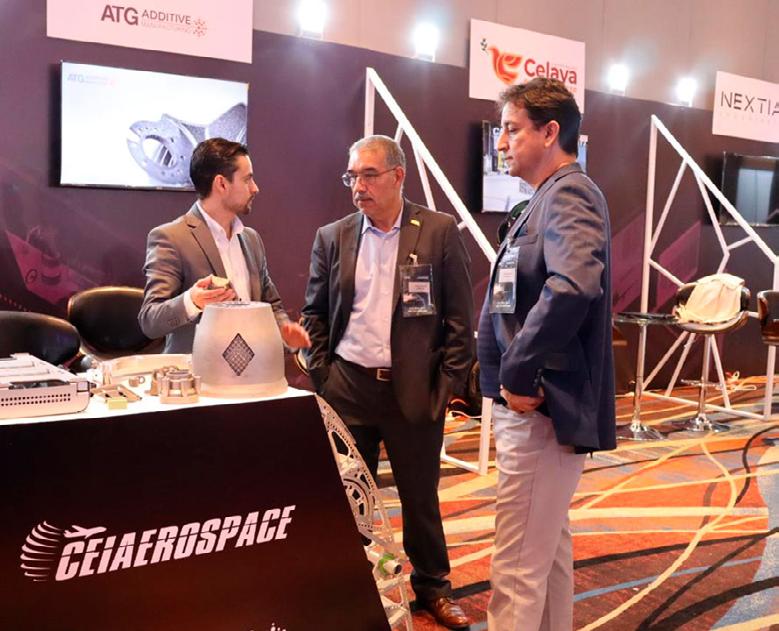


BAJA CALIFORNIA
The Center for Economic Studies of the Private Sector (CEESP) and the Baja California government, along with its seven municipalities, signed a Memorandum of Understanding (MoU) to improve the efficiency and transparency of building permits through regulatory enhancements for Construction Directors (DROs). This initiative, part of the USAID-supported “Competitive Municipalities” project, aims to reduce costs, delays, and bureaucratic barriers, benefiting both investors and local authorities. Jorge Velázquez, head of Jacobs, Cordova & Associates (JC&A) in Mexico, emphasized Baja California’s strategic positioning to attract high-value sectors like semiconductors due to global nearshoring trends. Enhanced permitting processes are expected to facilitate infrastructure development, supporting the region’s economic growth and competitiveness.
SOURCE: MEXICO INDUSTRY
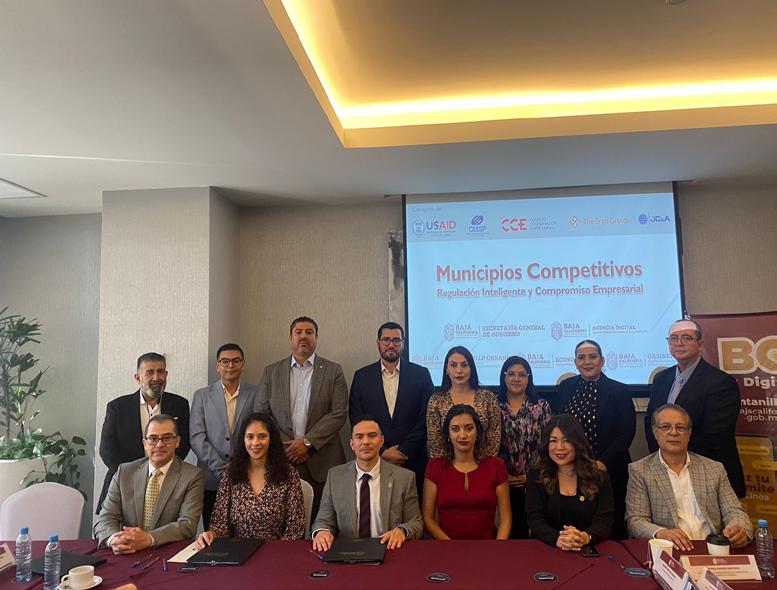

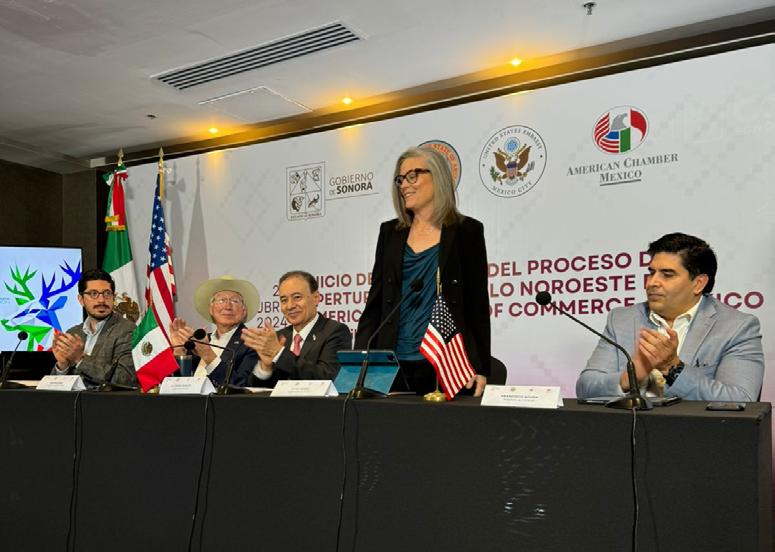


Governor Alfonso Durazo of Sonora and Arizona Governor Katie Hobbs have strengthened a strategic partnership for sustainable development in the Sonora-Arizona megaregion, which holds significant economic, social, and cultural importance for both Mexico and the United States. At the Sonora-United States Commission Plenary, both governors signed Memorandums of Understanding to enhance cooperation in education and natural resources, particularly focusing on sustainable energy, water quality, and environmental standards. Durazo highlighted the region’s exceptional comparative advantages within North America, with a shared vision for advancing clean energy, semiconductor manufacturing, and electromobility. U.S. Ambassador Ken Salazar underscored the alignment between the two countries, pointing to the Guaymas port as a critical asset for Arizona’s economic growth. Additionally, Francisco Cervantes, head of the Business Coordinating Council, praised Durazo’s commitment to fostering collaboration between the private sectors of both nations.
SOURCE: GOVERNMENT OF SONORA


The Pan American Development Foundation (PADF) conducted a work tour in Nuevo León in October to support the implementation of labor reform and the USMCA in key sectors like the automotive industry. During this visit, PADF held strategic meetings with government, industry, and civil society, including the Secretariat of Labor, the State Human Rights Commission, and business organizations such as CAINTRA, COPARMEX, the American Chamber Mexico Monterrey Chapter, and the Nuevo León Automotive Cluster. Discussions centered on labor needs, collaboration agreements, and initiatives like the “Company Committed to Human Rights” distinction and standards to prevent workplace violence.
Led by PADF Mexico Director Valeria Uribe and Program Director Edgar Lee, the delegation also hosted a workshop on collective bargaining best practices, involving executives from the automotive and aerospace clusters. Through these initiatives, PADF reinforced its commitment to labor rights, regulatory compliance, and improved labor practices in Nuevo León’s key sectors.
SOURCE: CLUSTER INDUSTRIAL



Torreón, Coahuila, is leveraging its industrial strengths to drive economic growth by integrating tourism into its development model. This strategy has created a “virtuous cycle” that boosts the local economy, evidenced by a 23% increase in economic revenue in the first half of 2024 and a rise in hotel occupancy. Sujeyl Alvarado, director of Torreón’s Convention and Visitors Bureau, highlighted collaborative efforts with hotels and associations to attract events, conventions, and business tourism. Major local companies like Peñoles, Lala, and Soriana attract business visitors, further supported by the city’s proximity to destinations like the “Pueblos Mágicos,” enhancing its tourism appeal. Alvarado emphasized diversifying into niche tourism, including wine tourism, adventure tourism, medical tourism, and religious tourism, to meet rising demands for authentic experiences and strengthen Torreón’s economic resilience.
SOURCE: EL ECONOMISTA
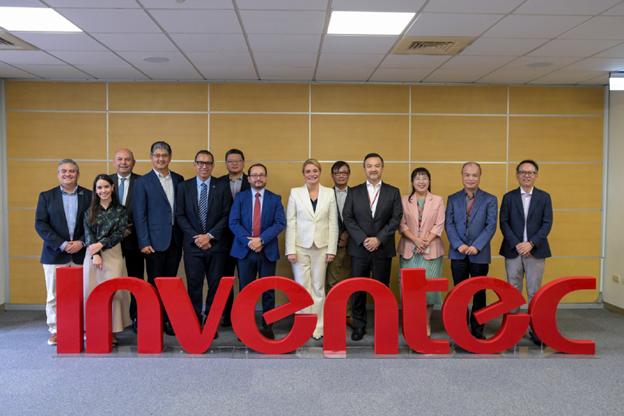

Chihuahua Governor María Eugenia Campos finalized a training program during her visit to Taiwan, allowing students from Chihuahua to stay in Taiwan for four months to gain advanced technical skills in sectors like semiconductors, electromobility, and automation. The program includes cultural and language training to facilitate integration into Taiwanese businesses, with a “train the trainers” model to share expertise locally. This initiative, signed by Chihuahua’s Secretariat of Innovation and Economic Development (SIDE), Instituto de Apoyo al Desarrollo Tecnológico (Inadet), and Taiwan’s Industrial Technology Research Institute (ITRI), aims to strengthen industrial collaboration. Campos also visited Wistron and met with Inventec executives, discussing innovation and investment projects benefiting Ciudad Juárez.
SOURCE: MEXICO NOW


The Government of Guanajuato has confirmed that construction on the Puerta Logística del Bajío will begin in the first quarter of 2025, with an investment of 2.5 billion pesos. At a meeting with Celaya’s mayor, Guanajuato Puerto Interior (GPI) director Héctor López Santillana outlined the project’s framework, emphasizing its significant regional impact. Focused on specialized rail logistics for established industries like automotive, the project is a partnership between GPI and Cointer Concesiones, part of Spain’s AZVI group, with strong local ties. The logistics company, based in Celaya, aims to strengthen Bajío’s competitiveness rather than attract new businesses. With seven key client agreements already in place, the initiative will offer tailored logistics solutions to sectors like grains, steel, automotive, and paper, positioning Puerta Logística as a strategic hub for national and international logistics.
SOURCE: MEXICO INDUSTRY
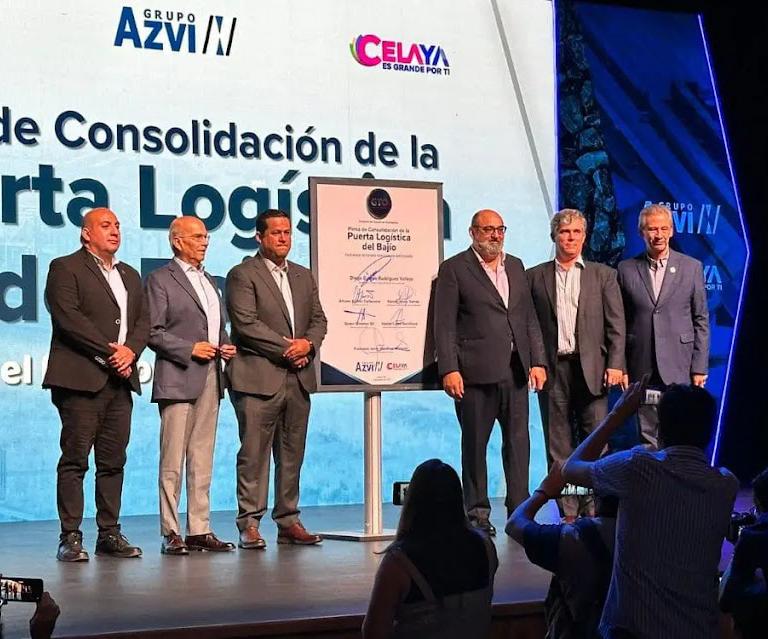


The industrial real estate market in Mexico City reached record highs in 2024, driven primarily by e-commerce and logistics demand. According to CBRE’s “MarketView Industrial” report, the region closed Q3 with 1.2 million square meters leased, a 55% increase from 2023. Mexico City’s metropolitan area attracted 46% of national foreign direct investment, with the U.S. leading at 44%, followed by Germany (11%) and Japan (9%). Logistics remains the dominant sector, making up 59% of leasing activity, while e-commerce accounts for 29%. Availability rates are at historic lows, with growing developments in corridors like Zumpango-AIFA to increase supply. New construction began on over 181,000 square meters in Q3, primarily in Cuautitlán, Tultitlán, Vallejo, and Iztacalco, with over 2.2 million square meters slated for development next year. Despite high construction activity, vacancy rates are expected to stay low due to pre-leasing trends, particularly in the Cuautitlán-Tultitlán-Tepotzotlán corridor, with just 0.8% vacancy.
SOURCE: EL ECONOMISTA

The State of Mexico (Edomex) has become a prime destination for the foreign automotive industry, with 11 plants dedicated to manufacturing light and heavy vehicles, as well as engines, according to Laura González, Secretary of Economic Development. Key to this appeal is Ford’s second-largest corporate and design center in Naucalpan, which employs 3,500 engineers and 1,500 administrative staff and relocated its headquarters from Santa Fe, now anchoring significant regional economic activity. This center is crucial for testing new vehicle models and supports young professionals, with an average employee age of 19-25. The Ford Cuautitlán Izcalli plant produced Mexico’s first electric vehicle, now exclusively manufacturing the electric Mustang. Advantages like geographic location, workforce availability, and connectivity continue to attract investment. The State of Mexico is aligning state investment programs with federal plans to enhance its appeal as a hub for automotive manufacturing and design, particularly in the electric vehicle sector.
SOURCE: LA JORNADA
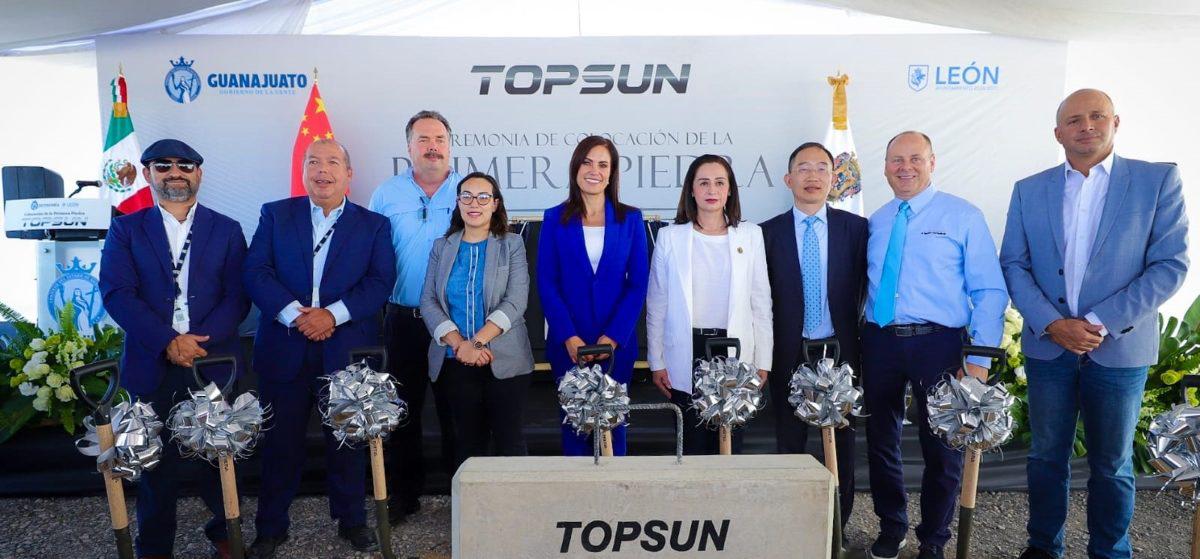
GRAND
Grand Topsun México held the groundbreaking ceremony for its plant in the PILBA Industrial Park in León, Guanajuato. The Chinese company will supply OEMs like General Motors with plastics parts, creating 800 jobs.
Bader, a company dedicated to the design, manufacturing, and installation of automotive interiors, will invest 16.5 million dollars, creating 400 new jobs in Lagos de Moreno, Jalisco.
Shandong Golden Empire will invest 165 million dollars in San Luis Potosí and will be located in the Logistik III Park in Villa de Reyes. The company will produce equipment for the automotive sector.
LG ELECTRONICS
LG Electronics inaugurated its new plant in the Santa María Industrial Park in Ramos Arizpe, Coahuila, with an investment of 61 million dollars. The plant will be dedicated to the production of automotive components.
The Kawasaki plant was inaugurated in Salinas Victoria, Nuevo León, where all-terrain vehicles will be produced. The investment amount is 200 million dollars, and it is projected to create 1,500 jobs by 2026.
SOURCE: MEXICO INDUSTRY, EL ECONOMISTA

• PROPOSED CONSTITUTIONAL REFORM FOR GENDER EQUALITY AND PROTECTION AGAINST GENDER-BASED VIOLENCE
Presented by: United Commissions of Constitutional Points
Purpose: The proposed decree reforms Articles 4, 24, 41, 73, and 123 of the Mexican Constitution, establishing a commitment to substantive equality and a life free of violence for all individuals. The State must reinforce protections for women, adolescents, and children and ensure that public security institutions adopt a gender perspective. Federal and state public administration appointments must follow gender parity principles, and federal authorities will have jurisdiction over gender-based violence protections. Justice institutions are required to establish specialized gender-focused investigative units. Status: Published in the Parliamentary Gazette
• PROPOSED REFORM TO FEDERAL LABOR LAW FOR BEREAVEMENT LEAVE
Presented by: Deputy Ramón Vázquez Valadez (BC - MORENA)
Purpose: The initiative seeks to amend Article 132 of the Federal Labor Law to establish a three-day paid bereavement leave for the death of a parent, child, sibling, or spouse. This leave will extend to five days if the deceased does not reside in the same state as the worker’s employment. Status: referred to the Commission for an opinion.

• PROPOSED REFORM TO FEDERAL LABOR LAW ON PROFIT SHARING
Presented by: Senator Geovanna del Carmen Bañuelos De la Torre (LNal - MORENA)
Purpose The initiative aims to amend Section VIII of Article 127 of the Federal Labor Law to prohibit establishing maximum limits on profit sharing for workers. The minimum amount for profit sharing will be based on the average received by the worker over the last five years, ensuring the most favorable amount is applied.
Status: Published in the Parliamentary Gazette.
• PROPOSED REFORM ON BREASTFEEDING PROVISIONS FOR WORKING MOTHERS
Presented by: Deputy Rubén Ignacio Moreira Valdéz (Plur - PRI)
Purpose: The initiative aims to amend Article 170 of the Federal Labor Law and Article 50 of the General Law on the Rights of Girls, Boys, and Adolescents regarding breastfeeding. It establishes that working mothers are entitled to two extraordinary breaks of thirty minutes each day for breastfeeding during a maximum period of six months. Additionally, authorities are tasked with promoting exclusive breastfeeding for the first six months and complementary breastfeeding up to two years through designated breastfeeding rooms in public and private workplaces.
Status: Published in the Parliamentary Gazette.

• REFORM TO REDUCE NEGATIVE CREDIT REPORTING PERIOD FROM 72 TO 36 MONTHS
Presented by: Rep. Ricardo Sóstenes Mejía Berdeja (Proportional Representation - PT)
Purpose: Amend Articles 20 and 23 of the Law Regulating Credit Information Companies to reduce the negative reporting period for financial service users, shortening the time non-compliance remains on record from 72 to 36 months.
Status: Referred to Commissions
ENVIRONMENT
• GENERAL LAW TO PROMOTE A CIRCULAR ECONOMY
Presented by: Sen. Karen Castrejón Trujillo (CDMX - PVEM)
Proposal: Establishes principles for a national circular economy policy, including a National Strategy with objectives and indicators. Promotes sustainable production, consumption, and food waste reduction, incentivizing companies to follow circular economy standards. Companies meeting these criteria may display a “Green Label.”
Status: Referred to Commissions
• NATIONAL LAW TO REGULATE ARTIFICIAL INTELLIGENCE (AI) USE AND MANAGEMENT
Presented by: Sen. Juanita Guerra Mena (MorPVEM)
Proposal: Establish a framework for AI regulation, defining principles, procedures, and coordination across public, private, and social sectors, focusing on data management and digital infrastructure. Objectives include national AI policy development, real-time access, regulatory body definitions, and the promotion of AI in IT and communications. Creates the National Center for Artificial Intelligence as an autonomous entity for policy coordination.
Status: Published in the Official Gazette of the Federation (DOF)
• DECREE TO ENSURE HUMAN RIGHTS NORMS CANNOT BE OVERRIDDEN AND LIMIT CHALLENGES TO CONSTITUTIONAL AMENDMENTS
Presented by: Adán Augusto López Hernández (MORENA)
Proposal: Amend Articles 1, 103, 105, and 107 to prevent human rights norms from being overridden and bar legal challenges (e.g., amparo trials) to constitutional amendments. Mandates law harmonization within 180 days and nullifies ongoing challenges to such amendments.
Status: Referred to Commissions
• REFORM TO PROHIBIT PERMITS FOR DOUBLETRAILER CARGO TRANSPORT
Presented by: Sen. Saúl Monreal Ávila (MORENA)
Proposal: Amend Articles 2, 50, and 74 TER of the Federal Roads, Bridges, and Motor Transport Laws to prohibit the Ministry of Infrastructure, Communications, and Transportation from granting permits for double-trailer or semi-trailer cargo transport. Authorizes the Ministry of Security and Citizen Protection to remove such vehicles from circulation.
Status: Published in the Official Gazette of the Federation (DOF)

Contract manufacturing can be a game-changer for North American companies aiming to stay competitive. Our latest blog explores how outsourcing production—especially to Mexico—offers significant advantages, from cost efficiency and access to skilled labor to streamlined logistics and supply chain flexibility. Learn why Mexico is a top destination for contract manufacturing, how to choose the right partner, and the benefits that nearshoring can bring to your business. Discover how contract manufacturing could be the key to your company’s success!
Since NAFTA, Mexico has proven to be a top destination for international companies looking to expand, especially manufacturers. Today, the nearshoring trend has highlighted Mexico’s strategic advantages even further. Our latest blog post explores how shelter service providers are key to a smooth transition, handling everything from recruitment and payroll to employment contracts, so companies can focus on their core business. Discover how shelter services can enhance workforce strategies and ensure compliance in Mexico, paving the way for a successful and efficient operation.
VISIT THE INSIGHTS SECTION ON OUR WEBSITE TO SEE SOME HIGHLIGHTED SUCCESS CASES.